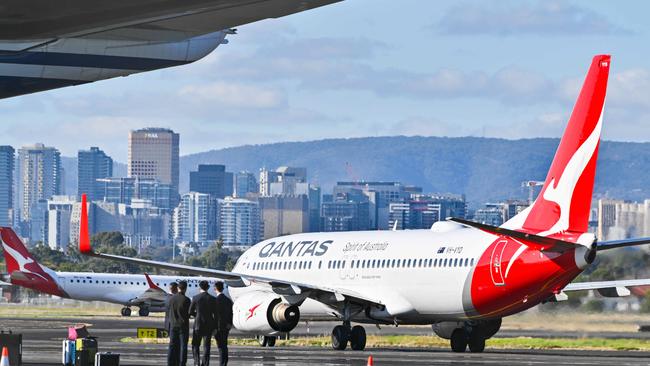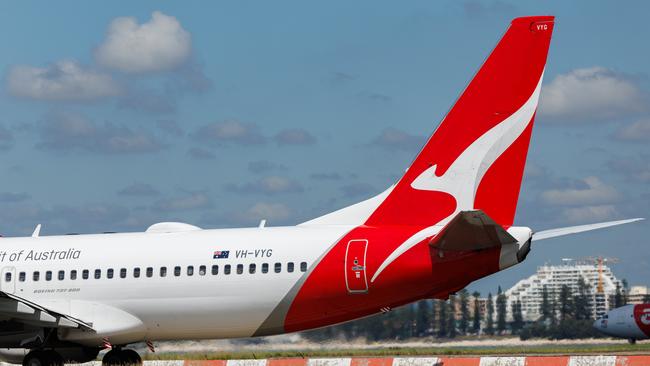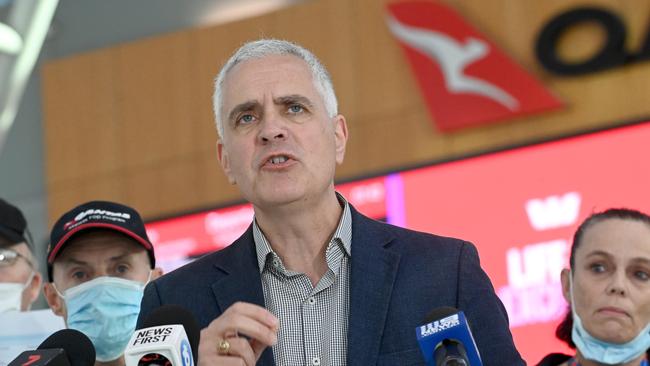
BHP and Rio Tinto have been lined up for the first attack, but Qantas has a similar enterprise agreement situation.
However, whereas a union “victory” over BHP and Rio would still see iron ore mined in Western Australia at current prices, a similar victory at Qantas would force a substantial reduction in international flights and increase the cost of local airfares.
The Reserve Bank’s national productivity ultimatum – make significant improvements or there will be no rate cuts – will be tested by many corporations, but especially Qantas.
Implementation of the Albanese government’s industrial relations legislation has the potential to send Qantas’s international operations into unsustainable losses and jeopardise the success of the so-called Sunrise program, which is designed to restore Qantas’s premium position in international markets.
How any union attack is managed will be one of the biggest challenges for chief executive Vanessa Hudson.
BHP, Rio Tinto and Qantas are among a number of companies that in a less competitive era entered into industrial agreements that in today’s world would send costs through the roof and lower productivity.

Some years ago Qantas, BHP and Rio replaced those old labour arrangements for the great majority of their staff. But they were not far-sighted enough to go through the pain of having the old agreements cancelled, and they still lie there with very few people involved.
Under the same pay, same work provisions of the industrial relations legislation, the way is open for Qantas unions to ram through far higher pay levels and much lower productivity by making the old agreements standard practice.
Qantas is an unusual business because most of its capital outlays are directed towards the international operation while most of its profits come from its domestic operation, which is not nearly as capital-intensive.
On the international front, Qantas competes against the Middle Eastern airlines and other majors like Singapore Airlines, where pay rates and costs are already lower than Australian rates.
But if the old agreements are restored, the gap will be enormous. Qantas would suffer heavy losses on international routes unless it can secure much higher prices or gain regulatory protection.
Under the Albanese act, a union challenge to international viability and jobs does not require staff approval.
Such a challenge is likely to come as the Qantas plan to counter the power of the lower-cost international airlines, devised by Alan Joyce, nears implementation.
The Sunrise project will see Australian travellers flying non-stop from the east coast to both Europe and the US, including London and New York, on specially adapted aircraft.
To match Qantas, rival airlines would also need to spend large sums adapting aircraft specifically for the Australian market.
While they might do it, such an investment would not be an economic decision, given that the attraction of long-haul services is limited to the Australian market.
If the old Qantas agreements are restored, it would be very hard for Qantas to justify the prices necessary to run the Sunrise program. Managing this situation is going to require great skill not only from Vanessa Hudson but from the entire board.

The current Qantas board is still reeling from the fact that it didn’t challenge Joyce in a number of key issues, such as pushing a yes vote in the voice referendum.
No one knows what changes new chairman John Mullen will make, but whatever moves are made will require a board that can challenge and debate industrial relations strategies with the CEO.
My impression is that Joyce saw that Qantas needed a different cost and productivity structure, but he was not able to make the changes with goodwill, so he used strategies where lawyers dominated.
And that legalistic approach became embedded in the culture of the company. While it might have reduced costs, it led to the selling of tickets on cancelled flights and lower staff morale, which was a disaster for a national carrier.
It spurred deep union hatred of Joyce, and many in the unions will have great joy in jeopardising any idea that arose during the Joyce era.
What is often forgotten is that Joyce steered the company through the Covid-19 crisis, which saw its revenue fall to zero. It has left a severe scar on the balance sheet, which has no shareholder funds. Its capital comes from fares paid in advance and a similar arrangement from its frequent flyer program.
Qantas does not have the balance sheet to withstand union “victories” in the same way as BHP and Rio Tinto.
And in a world where the possibility of military conflict is increasing, all international airlines carry greater risks than they did a year ago. Without shareholders’ funds, if a war were to break out Qantas would rely on the federal government and/or the CBA (which has given Qantas a large line of credit) to enable the company to survive. And that is not only an unsatisfactory overall situation, but, longer term, it also makes union attacks more perilous for both staff and shareholders.






Qantas is bracing itself for the likelihood that it will be the next target of unions using the 700-page industrial relations laws to restore low productivity and reduce profits.